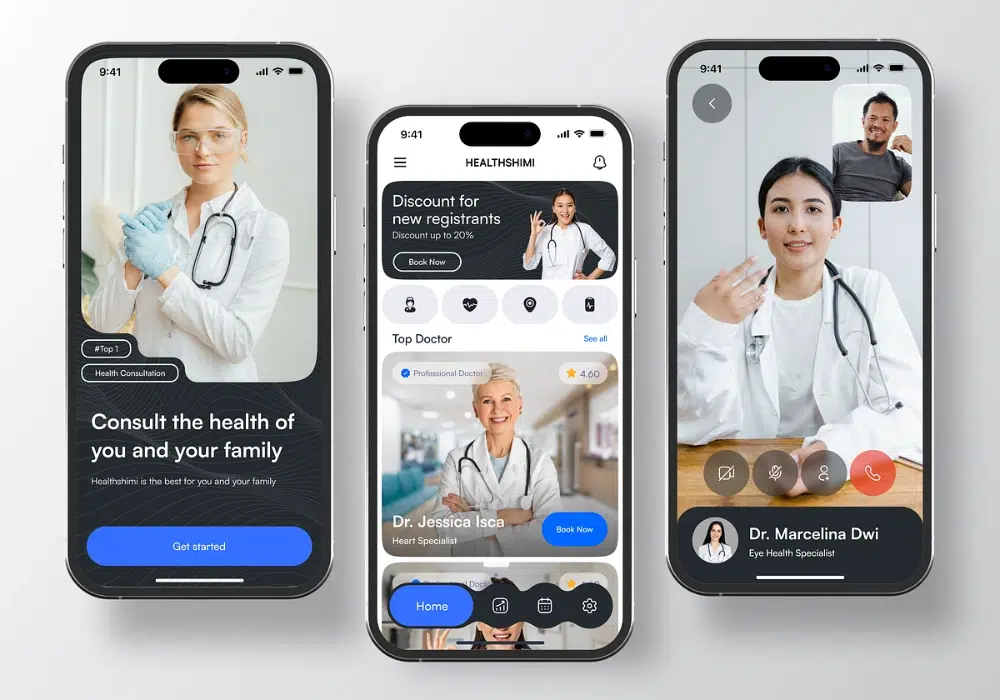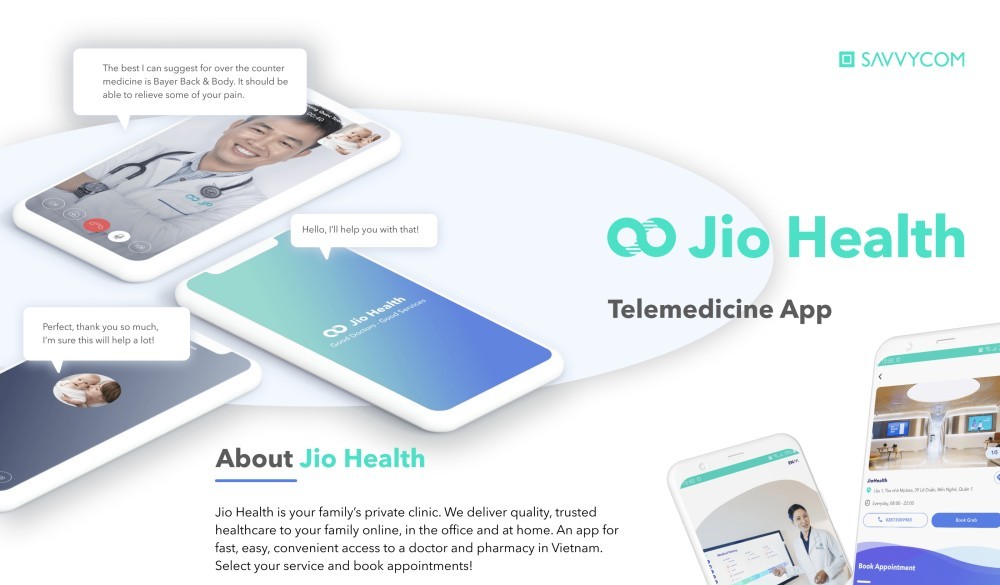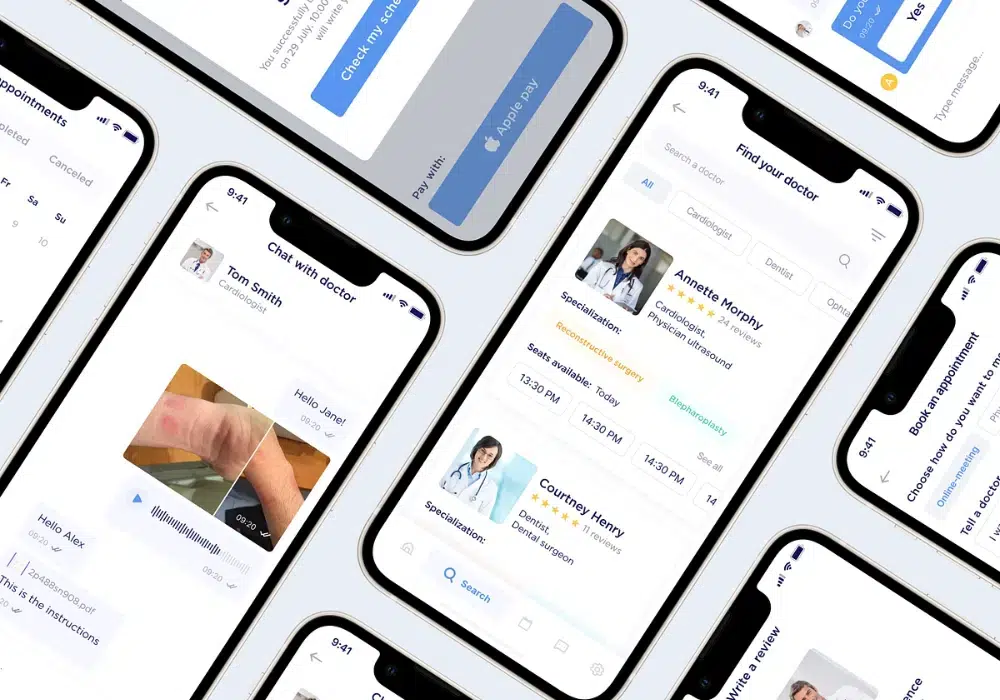How to Build A Successful Healthcare App: Complete 2025 Guide
The global mobile health (mHealth) apps market is experiencing unprecedented growth, projected to reach $88.70 billion by 2032, exhibiting a CAGR of 11.8% during the forecast period mHealth Apps Market Size, Competitors & Forecast to 2030. Yet despite this booming market, studies show that over 90% of healthcare apps fail to gain significant user adoption within their first year. The difference between success and failure often lies in understanding the unique complexities of healthcare app development and following a proven, comprehensive approach.
Healthcare has undergone a revolutionary transformation driven by technological advancements and the rise of mobile applications. The global healthcare mobile application market size was valued at USD 114.18 billion in 2024 and is projected to grow at a CAGR of 45.2% from 2025 to 2030 AI in Healthcare Statistics: 20+ Key Facts for 2025-2029.
The healthcare app landscape in 2025 is defined by several key trends: AI integration with 47% of healthcare organizations already using or planning to implement generative AI-powered virtual assistants and chatbots, the rise of chronic disease management solutions addressing over 20 million new cancer cases and more than 53.5 million survivors mHealth Market Size, Share, Trends & Growth Analysis Report – 2030, and the growing demand for remote patient monitoring capabilities.
From telemedicine platforms to personalized health monitoring systems, healthcare apps have become essential tools in modern healthcare ecosystems. However, creating a successful healthcare app requires more than just technical expertise—it demands deep understanding of regulatory compliance, user experience design, and the unique challenges facing both patients and healthcare providers.
At Savvycom, we’ve spent 15 years developing healthcare solutions that make a real difference. With over 500+ successful projects and a 92% client retention rate, we’ve learned what separates successful healthcare apps from the thousands that fail. This comprehensive guide will walk you through our proven 10-step methodology, backed by real case studies and the latest 2025 market insights, to help you build a healthcare app that not only succeeds but transforms patient care.
1. Understanding Healthcare Mobile App Development

Healthcare mobile app development encompasses a broad spectrum of applications designed to improve patient outcomes, streamline healthcare delivery, and enhance the overall healthcare experience. These digital solutions serve as bridges between patients and healthcare providers, offering unprecedented access to medical services and health information.
The purpose of mobile healthcare applications varies significantly based on their target audience and intended use case. mHealth apps simplify complex healthcare processes by providing 24/7 access to medical services, enabling remote patient monitoring, facilitating appointment scheduling, and offering personalized health insights. Overall, the success of a healthcare app depends on its ability to address specific healthcare challenges while maintaining regulatory compliance and user engagement.
Professional Healthcare Apps
Professional healthcare applications are sophisticated tools designed specifically for medical practitioners and healthcare institutions. These apps require advanced functionality and seamless integration with existing healthcare systems.
Electronic Health Records (EHR) Integration Apps
Allow healthcare providers to access and update patient records in real-time. Jio Health’s telemedicine platform enables doctors to access comprehensive patient histories, facilitating more informed medical decisions during remote consultations mHealth Apps Market Size to Hit USD 154.12 Billion by 2034.
Clinical Decision Support Systems
leverage AI and machine learning to assist healthcare providers in making evidence-based decisions. 76% of all AI-enabled medical devices authorized for sale in the US are used in radiology, demonstrating the significant impact of AI in diagnostic processes.
Telemedicine Platforms have become essential, especially following the pandemic. These apps enable video consultations, remote diagnostics, and digital prescription management, making healthcare more accessible to patients regardless of location.
Healthcare Apps for Patients
Patient-focused healthcare applications empower individuals to take control of their health journey through accessible, user-friendly interfaces and personalized features.
Chronic Disease Management Apps
Help patients monitor conditions like diabetes, hypertension, and heart disease. Our DiabTracker app, developed for diabetes management, demonstrated a 40% improvement in patient medication adherence and a 25% reduction in emergency hospital visits among users.
Mental Health and Wellness Apps
Address the growing mental health crisis, providing meditation guides, mood tracking, and access to mental health professionals. Mental health applications are gaining significant traction, with digital therapeutics showing promising results in treating anxiety and depression mHealth Market Size, Share, Trends & Growth Analysis Report – 2030.
Fitness and Lifestyle Apps
Promote preventive healthcare by encouraging healthy habits. These apps typically include features like activity tracking, nutrition monitoring, and personalized wellness recommendations.
Medication Management Apps
Help patients maintain proper medication schedules, reducing the risk of missed doses or dangerous drug interactions. These apps often include pill reminders, dosage tracking, and pharmacy integration.
2. Healthcare App Development Benefits
3. Savvycom Case Studies Introduction
At Savvycom, our 15 years of healthcare technology experience has resulted in numerous successful projects. Here are three case studies that showcase different aspects of healthcare app success:
Case Study 1: Jio Health – Revolutionizing Telemedicine

Client: Jio Health – Vietnam’s leading telemedicine platform
Challenge: Creating a comprehensive telemedicine solution connecting patients with healthcare providers across Vietnam
Our Solution
We developed a multi-platform telemedicine app featuring:
- Secure video consultations optimized for low-bandwidth connections
- AI-powered doctor matching algorithm
- Integrated Vietnamese payment systems
- Medical record management with HIPAA compliance
Results Achieved
- 500,000+ registered users within the first year
- 95% user satisfaction rate based on post-consultation surveys
- 40% reduction in consultation costs compared to in-person visits
- 24/7 healthcare access for patients in remote areas
- 150+ healthcare providers actively using the platform
Case Study 2: Surgery Booking Platform for Premier US Healthcare Institution

Client: Leading US healthcare institution specializing in Pectus Excavatum Repair surgery
Challenge: Streamlining complex surgery booking process and improving patient communication
Our Solution
Built using PHP Laravel Framework and MySQL, featuring:
- Intelligent appointment scheduling with automated conflict resolution
- Patient education portal with comprehensive procedure information
- Secure communication channels between patients and care teams
- Document management for medical records and test results
Measurable Results
- 65% reduction in appointment scheduling time
- 30% faster appointment booking process
- 95% patient satisfaction score
- 50% reduction in no-show rates through automated reminders
- 40% decrease in administrative workload
Case Study 3: AI-Powered Chronic Disease Management Platform
Client: Multi-specialty medical practice network
Challenge: Improving chronic disease management for diabetes and hypertension patients
Our Solution
AI-powered platform with advanced features:
- Real-time health monitoring with wearable device integration
- Machine learning algorithms for predictive health insights
- Smart medication management with adherence tracking
- Emergency alert system for critical readings
Outstanding Results
- 40% improvement in medication adherence
- 35% improvement in early disease detection rates
- 25% reduction in emergency hospital visits
- $500,000 estimated annual savings in emergency care costs
- 60% of diabetic patients achieved target HbA1c levels
Key Success Factors
1. User-Centered Design
All successful projects prioritized understanding the unique needs of both patients and healthcare providers from day one.
2. Built-in Compliance
HIPAA and regulatory requirements were integrated into the platform foundation, not added as an afterthought.
3. AI-Driven Automation
The most successful outcomes came from platforms that intelligently automated routine tasks while providing meaningful insights.
4. Measurable Impact
By focusing on specific, measurable improvements in patient outcomes and operational efficiency, these platforms proved their value and secured long-term adoption.
These case studies demonstrate that successful healthcare apps require deep understanding of healthcare workflows, regulatory compliance, and user needs. Our proven methodology combines healthcare expertise, technical innovation, and user-centered design to deliver measurable results for our clients.
4. Essential Features for Healthcare App Success
Building a successful healthcare app requires careful consideration of both core functionality and advanced features that differentiate your solution in a competitive market. Based on our experience developing healthcare solutions, here are the essential features that drive user adoption and clinical success.
5. 10-Step Healthcare App Development Process

Based on our 15 years of experience and 500+ successful healthcare projects, we’ve refined a comprehensive 10-step methodology that ensures healthcare app success while maintaining regulatory compliance and user satisfaction.
Step 1: Market Research and Validation
- Identify Target Market Needs: Conduct comprehensive market analysis to understand current healthcare challenges, competitor solutions, and unmet patient needs. Utilize surveys, interviews, and focus groups with both healthcare providers and patients to validate your app concept.
- Competitive Analysis: Analyze existing healthcare apps in your target category, identifying their strengths, weaknesses, and market positioning. Look for gaps in functionality, user experience issues, or underserved market segments that your app can address.
- Regulatory Landscape Assessment: Understand the regulatory requirements for your target markets, including HIPAA in the US, GDPR in Europe, and other relevant healthcare regulations. Early regulatory planning prevents costly redesigns later in the development process.
- Market Size and Revenue Potential: Validate the commercial viability of your healthcare app concept. The global mHealth apps market size is projected to grow from $40.65 billion in 2025 to $88.70 billion by 2032 mHealth Apps Market Size, Competitors & Forecast to 2030, indicating strong market demand for innovative healthcare solutions.
Step 2: Define App Goals and Key Performance Indicators
- Establish Clear Objectives: Define specific, measurable goals for your healthcare app. Whether improving patient medication adherence, reducing hospital readmission rates, or streamlining administrative processes, clear objectives guide development decisions and success metrics. Consider exploring innovative healthcare app ideas that address specific pain points in your target market while ensuring measurable ROI.
- Identify Key Performance Indicators: Establish KPIs that align with your app’s objectives, such as user engagement rates, clinical outcome improvements, cost savings, or patient satisfaction scores. Our DiabTracker app achieved a 40% improvement in medication adherence, demonstrating measurable clinical impact.
- User Journey Mapping: Create detailed user journeys for all app personas, including patients, healthcare providers, and administrators. Understanding how different users will interact with your app helps identify critical features and potential pain points.
- Success Criteria Definition: Establish specific benchmarks for app success, including user adoption rates, retention metrics, and clinical outcomes. These criteria will guide development priorities and post-launch optimization efforts.
Step 3: Choose Technology Stack and Architecture
- Platform Selection: Decide between native iOS/Android development, cross-platform frameworks, or progressive web applications based on your target audience, budget, and feature requirements. Consider that the iOS segment led the market in 2024, capturing a revenue share of 53% How Digital & AI Will Reshape Health Care in 2025 | BCG due to Apple’s stringent security standards.
- Backend Infrastructure: Design scalable, secure backend architecture that can handle healthcare data volumes and comply with regulatory requirements. Cloud solutions like AWS, Google Cloud, or Microsoft Azure offer HIPAA-compliant infrastructure options.
- Database Design: Implement robust database architecture that supports complex healthcare data relationships while maintaining high performance and security standards. Consider using encrypted databases and backup systems to protect patient information.
- Integration Requirements: Plan for integration with Electronic Health Records (EHR), pharmacy systems, laboratory networks, and other healthcare infrastructure. API-first design ensures seamless connectivity with existing healthcare systems.
Step 4: Design User Experience and Interface
- User-Centered Design: Prioritize usability and accessibility in your design process. Healthcare apps serve diverse user groups, including elderly patients who may have limited technical skills and healthcare providers who need efficient workflows during busy clinical environments.
- Accessibility Compliance: Ensure your app meets accessibility standards (WCAG 2.1) to serve users with disabilities. Include features like voice navigation, screen reader compatibility, and adjustable text sizes.
- Clinical Workflow Integration: Design interfaces that seamlessly integrate with existing clinical workflows. Healthcare providers need apps that enhance rather than disrupt their established practices. Our surgery booking platform achieved 95% user satisfaction by closely mimicking familiar clinical processes.
- Visual Design and Branding: Create a professional, trustworthy visual identity that instills confidence in healthcare users. Use calming colors, clear typography, and intuitive iconography that aligns with healthcare industry standards.
Step 5: Develop Minimum Viable Product (MVP)
- Core Feature Prioritization: Identify the minimum set of features required to deliver value to users and validate your app concept. Focus on essential functionality that addresses primary user needs while maintaining regulatory compliance.
- Agile Development Methodology: Implement iterative development cycles that allow for continuous feedback and improvement. Regular sprint reviews with healthcare stakeholders ensure the app meets clinical requirements and user expectations.
- Prototype Testing: Conduct early prototype testing with target users to identify usability issues and gather feedback on core functionality. This early validation prevents costly changes during later development phases.
- Regulatory Compliance Integration: Build compliance features into the MVP foundation rather than adding them later. Early compliance implementation ensures all subsequent features maintain regulatory standards.
Step 6: Implement AI and Advanced Features
- AI Integration Strategy: Machine Learning is currently the leader in healthcare AI applications, but Natural Language Processing has the potential to be the market leader in the future. Plan your AI implementation based on specific use cases like predictive analytics, chatbots, or diagnostic assistance.
- Machine Learning Implementation: Develop ML models for personalized health recommendations, risk prediction, or treatment optimization. Ensure your AI systems are trained on diverse, representative datasets to avoid bias in healthcare recommendations.
- Natural Language Processing: Implement NLP capabilities for clinical documentation, patient communication, and symptom analysis. These features can significantly reduce administrative burden while improving data quality.
- Predictive Analytics: Develop predictive models that can identify health risks, predict treatment outcomes, or optimize care delivery. Our predictive analytics solutions have shown 35% improvement in early disease detection rates.
Step 7: Ensure Comprehensive Compliance
- HIPAA Compliance Implementation: Implement comprehensive HIPAA compliance measures including data encryption, access controls, audit logs, and breach notification procedures. Regular compliance audits ensure ongoing adherence to regulatory requirements.
- International Regulatory Compliance: If targeting global markets, ensure compliance with international regulations like GDPR in Europe, PIPEDA in Canada, or other relevant healthcare privacy laws.
- Clinical Validation: Conduct clinical studies or validation testing to demonstrate your app’s safety and efficacy. This validation is increasingly important for regulatory approval and market acceptance.
- Risk Management: Implement comprehensive risk management procedures including data backup, disaster recovery, and incident response protocols. Healthcare apps require robust risk mitigation due to the critical nature of medical data.
Step 8: Comprehensive Testing and Quality Assurance
- Security Testing: Conduct thorough security testing including penetration testing, vulnerability assessments, and encryption validation. Healthcare apps are prime targets for cyberattacks, making security testing critical.
- Performance Testing: Test app performance under various conditions including high user loads, poor network connectivity, and integration with multiple healthcare systems. Healthcare providers need reliable apps that perform consistently in clinical environments.
- Usability Testing: Conduct extensive usability testing with real healthcare users including patients, doctors, and healthcare administrators. Focus on task completion rates, error rates, and user satisfaction metrics.
- Regulatory Testing: Ensure your app meets all regulatory requirements through comprehensive compliance testing. This includes data handling procedures, audit trail functionality, and privacy controls.
Step 9: Launch Strategy and Market Entry
- Soft Launch Strategy: Begin with a limited release to a controlled user group to identify any remaining issues and gather initial user feedback. Healthcare apps benefit from gradual rollouts that allow for iteration based on real-world usage.
- Healthcare Provider Partnerships: Establish partnerships with healthcare institutions, medical practices, or health systems to validate your app and gain credibility in the healthcare market. These partnerships often provide valuable case studies and testimonials.
- Regulatory Submissions: Submit your app for relevant regulatory reviews or certifications. While not all healthcare apps require FDA approval, demonstrating regulatory compliance enhances market credibility.
- Marketing and User Acquisition: Develop targeted marketing strategies that reach both healthcare providers and patients. Healthcare marketing requires different approaches than consumer apps, focusing on clinical outcomes and professional recommendations.
Step 10: Post-Launch Optimization and Scaling
- Continuous Monitoring: Implement comprehensive monitoring systems to track app performance, user engagement, and clinical outcomes. Regular monitoring helps identify issues quickly and demonstrates ongoing value to healthcare stakeholders.
- Feature Enhancement: Based on user feedback and usage analytics, continuously add new features and improve existing functionality. Healthcare apps require ongoing evolution to meet changing clinical needs and regulatory requirements.
- Scale Planning: Plan for scaling your app infrastructure, user support systems, and development team as user adoption grows. Healthcare apps often experience rapid growth once they demonstrate clinical value.
- Outcome Measurement: Regularly measure and report on clinical outcomes and user satisfaction metrics. These measurements are crucial for demonstrating app value and securing ongoing healthcare partnerships.
6. Cost Analysis and Investment Planning
Understanding the financial investment required for healthcare app development is crucial for project planning and budgeting. Healthcare app development cost varies significantly based on app complexity, feature requirements, and regulatory compliance needs. Based on our experience with healthcare projects, the investment can range from basic telemedicine solutions to comprehensive platforms requiring integration with medical coding language systems and EDI in healthcare standards.
Basic Healthcare App: $45,000 – $80,000
- Core features: user profiles, appointment scheduling, basic communication
- Single platform (iOS or Android)
- Basic compliance features
- 3-4 months development timeline
Advanced Healthcare App: $80,000 – $150,000
- AI integration, telemedicine capabilities, wearable integration
- Cross-platform development
- Comprehensive HIPAA compliance
- EHR integration capabilities
- 6-8 months development timeline
Enterprise Healthcare Solution: $150,000+
- Complex AI/ML features, predictive analytics
- Multiple user roles and advanced administration
- Custom integrations with healthcare systems
- Comprehensive regulatory compliance across multiple jurisdictions
- 8+ months development timeline
Vietnam Development Advantage
Working with experienced Vietnamese development teams like Savvycom offers significant cost advantages without compromising quality:
- Cost Savings: 40-60% lower development costs compared to US or European developers while maintaining international quality standards.
- Quality Assurance: Our 15 years of experience and 92% client retention rate demonstrate our commitment to delivering high-quality healthcare solutions.
- Regulatory Expertise: Deep understanding of international healthcare regulations including HIPAA, GDPR, and other compliance requirements.
- Time Zone Benefits: Convenient time zone alignment with APAC markets and productive overlap with US/European business hours for international projects.
7. Choosing the Right Development Partner
Selecting the right development partner is perhaps the most critical decision in your healthcare app development journey. The complexity of healthcare regulations, the need for clinical validation, and the importance of user trust make partner selection crucial to project success.
Essential Partner Criteria
- Healthcare Experience: Look for development partners with proven healthcare industry experience. At Savvycom, our 15 years in healthcare technology and portfolio of successful projects including telemedicine platforms, chronic disease management apps, and hospital management systems demonstrate our deep understanding of healthcare challenges.
- Regulatory Compliance Expertise: Your development partner must understand healthcare regulations including HIPAA, GDPR, and FDA requirements. We’ve successfully navigated regulatory compliance for healthcare clients across multiple jurisdictions.
- Technical Excellence: Healthcare apps require advanced technical capabilities including AI/ML integration, real-time data processing, and secure data management. Our technical expertise spans the full healthcare technology stack.
- Post-Launch Support: Healthcare apps require ongoing support, updates, and maintenance. Choose a partner committed to long-term relationships rather than one-time project delivery.
Why Choose Savvycom
- Proven Track Record: With 500+ successful projects and clients across 30+ countries, we’ve demonstrated consistent delivery of high-quality healthcare solutions.
- Healthcare Specialization: Our dedicated healthcare team understands the unique challenges of medical app development, from clinical workflow integration to regulatory compliance.
- Comprehensive Services: From initial consultation through post-launch optimization, we provide end-to-end healthcare app development services.
- Client Success Stories: Our healthcare clients have achieved measurable results including improved patient outcomes, increased operational efficiency, and successful regulatory approvals.
8. Future Trends and Technologies in Healthcare Apps
The healthcare app landscape continues to evolve rapidly, driven by technological advances and changing healthcare delivery models. Understanding these trends helps ensure your healthcare app remains competitive and valuable.
Artificial Intelligence and Machine Learning
Predictive Healthcare: AI in diagnostics beyond imaging (e.g., pathology, genomics) is set to grow at 35% CAGR over 5 years. AI-powered predictive models will increasingly identify health risks before symptoms appear, enabling preventive interventions.
Personalized Medicine: Machine learning algorithms analyze individual patient data to recommend personalized treatment plans, medication dosages, and lifestyle modifications tailored to specific genetic profiles and health conditions.
Clinical Decision Support: AI-powered clinical decision support systems provide real-time recommendations to healthcare providers, improving diagnostic accuracy and treatment outcomes.
Internet of Medical Things (IoMT) Integration
Wearable Device Connectivity: Seamless integration with smartwatches, fitness trackers, and medical-grade wearables enables continuous health monitoring and real-time data collection.
Remote Patient Monitoring: Advanced sensors and connected devices allow healthcare providers to monitor patients remotely, reducing hospital readmissions and enabling early intervention for chronic conditions.
Smart Medical Devices: Integration with connected medical devices like glucose monitors, blood pressure cuffs, and heart rate monitors provides comprehensive health data for clinical decision-making.
Blockchain and Data Security
Secure Health Records: Blockchain technology offers immutable, secure storage for health records while enabling patient-controlled access to personal health information.
Drug Traceability: Blockchain solutions help prevent counterfeit medications by providing transparent supply chain tracking from manufacturer to patient.
Clinical Trial Integrity: Blockchain ensures the integrity of clinical trial data, reducing fraud and improving the reliability of medical research.
9. Conclusion and Next Steps
Building a successful healthcare app requires more than just technical expertise—it demands deep understanding of healthcare workflows, regulatory compliance, and user needs. The healthcare app market presents enormous opportunities, with the global mHealth apps market projected to reach $88.70 billion by 2032 mHealth Apps Market Size, Competitors & Forecast to 2030, but success requires careful planning, experienced development partners, and ongoing commitment to quality and compliance.
Throughout this guide, we’ve outlined our proven 10-step methodology based on 15 years of healthcare technology experience and 500+ successful projects. From initial market research through post-launch optimization, each step builds upon the previous to ensure your healthcare app not only launches successfully but delivers measurable value to patients and healthcare providers.
The key to healthcare app success lies in balancing innovation with compliance, user experience with clinical effectiveness, and technical capabilities with practical healthcare needs. Our case studies demonstrate that well-executed healthcare apps can achieve significant clinical outcomes while generating strong business returns.
Your Next Steps
- Define Your Healthcare App Vision: Clearly articulate the healthcare problem your app will solve and the measurable outcomes you expect to achieve.
- Conduct Market Validation: Validate your app concept with target users including patients, healthcare providers, and healthcare administrators.
- Plan Your Compliance Strategy: Understand the regulatory requirements for your target markets and plan compliance from the beginning rather than adding it later.
- Select an Experienced Development Partner: Choose a development partner with proven healthcare experience and a track record of successful healthcare app launches.
- Develop a Comprehensive Go-to-Market Strategy: Plan your app launch, user acquisition strategy, and ongoing marketing efforts to ensure market success.
10. Partner with Savvycom for Healthcare App Success
At Savvycom, we’re committed to helping healthcare organizations and entrepreneurs build apps that make a real difference in patient care. Our comprehensive healthcare app development services, combined with our deep industry expertise and proven methodology, provide the foundation for healthcare app success.
Ready to transform your healthcare app idea into reality? Contact our healthcare technology experts today for a free consultation. We’ll help you validate your concept, plan your development strategy, and build a healthcare app that delivers measurable value to your users and your business.
Contact Savvycom:
- Email: [email protected]
- Phone: +84 24 3202 9222
- Website: savvycomsoftware.com
Let’s build the future of healthcare technology together.
How much does it cost to make medical apps for healthcare professionals?
Based on the factors described above, the cost of developing a healthcare application would be between 45,600 - 166,500 USD. The pricing varies depending on the platforms, technology stack, and number of features to be integrated into your app, so it can be lower or higher than this general estimation.
Which technology is best for healthcare app development?
The top mobile app technologies for designing healthcare applications are Python, Java, Flutter, Swift, Kotlin, R Programming, and others. However, it is essential that you seek the opinion of your development team while selecting a technology stack. Your healthcare app developers will decide on technologies based on your app and budget.
What is the role of AI in healthcare app and software development?
In healthcare app and software development, AI can help in developing predictive models, analyzing health data for insights, improving patient engagement, personalizing healthcare, and automating routine tasks. It can also assist in tasks like image recognition for diagnostic purposes.
Why do healthcare apps need to be HIPAA compliant?
If your healthcare app collects, handles, or transfers any protected healthcare information, the union recommends that it be built with HIPAA compliance in mind. This assures that the medical information is encrypted and secure, and that it will only be accessed for the purposes of patient diagnosis and research.


